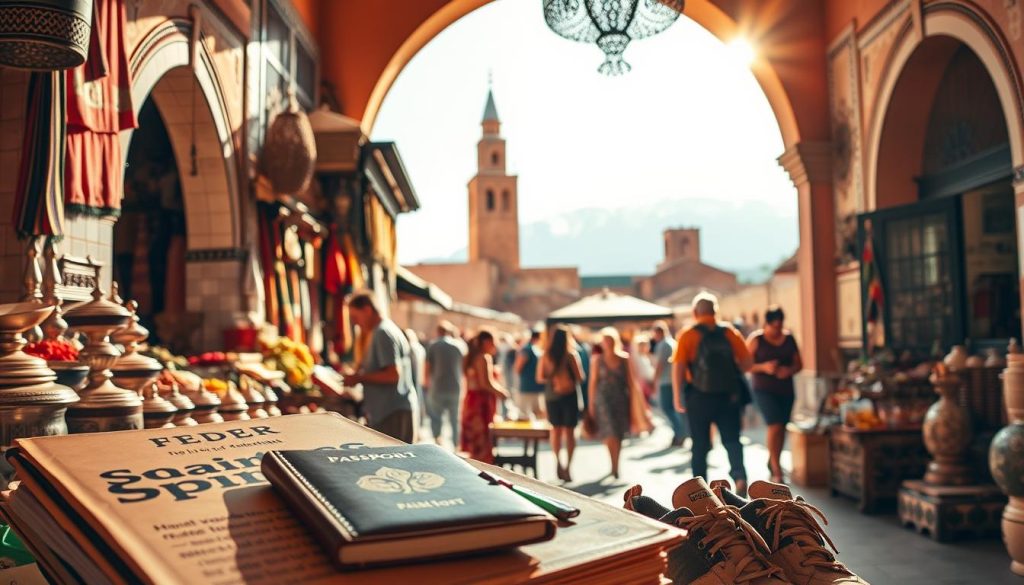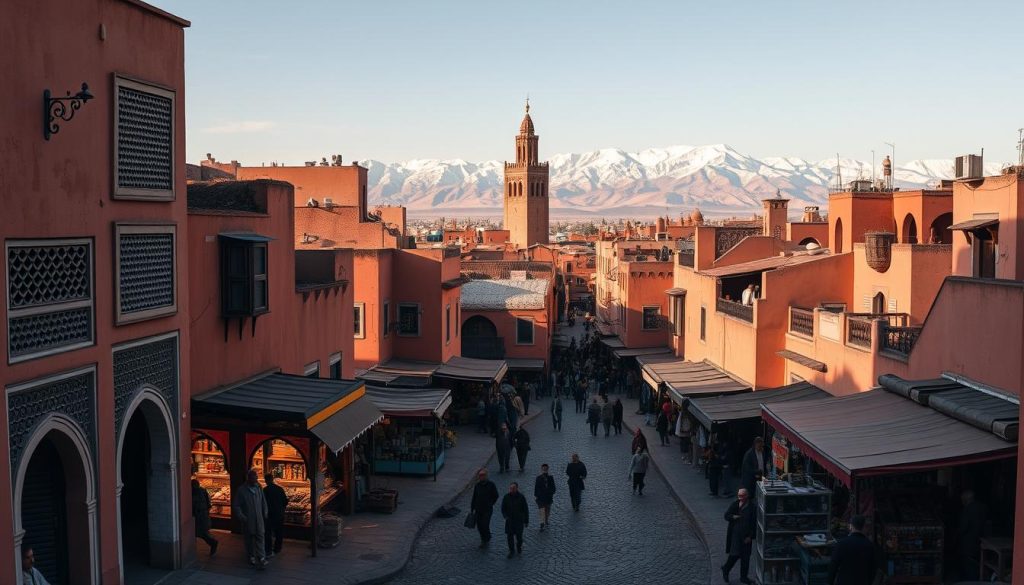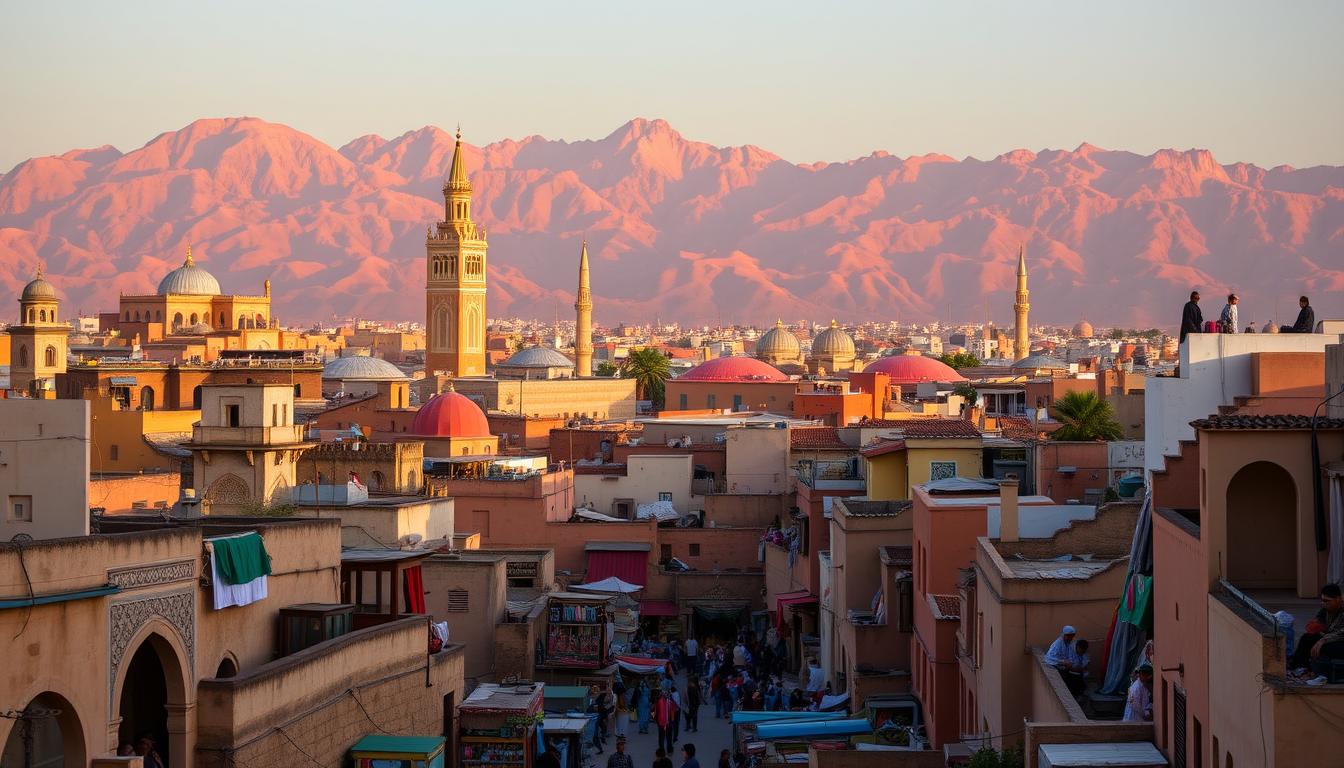Start an unforgettable journey in Morocco, where old traditions meet modern life. Our guide will show you the hidden wonders of this North African gem. You’ll find bustling medinas, beautiful landscapes, and a rich culture waiting for you.
From Marrakech’s winding streets to the Sahara’s golden sands, Morocco is a feast for the senses. We’ll guide you through its diverse landscapes and help you find cultural treasures. You’ll make memories that will stay with you forever.
Our guide is packed with insider tips to make your trip extraordinary. Whether you’re into history, food, or culture, Morocco has it all. Get ready for an adventure that will exceed your dreams.
Key Takeaways
- Discover Morocco’s diverse landscapes and rich cultural heritage
- Navigate unique urban experiences in historic cities
- Explore authentic Moroccan traditions and local customs
- Prepare for an immersive travel adventure across multiple regions
- Unlock insider tips for a memorable Moroccan journey
Planning Your Perfect Morocco Trip
Planning a trip to Morocco needs careful thought and insider tips. Our guide will walk you through the details of exploring this magical place. You’ll learn about the best times to visit and how to manage your travel plans.

Best Time to Visit Morocco
Choosing the right time for your Morocco trip depends on what you want to do. The best time to visit Morocco changes based on where you go and what you want to see:
- Spring (March-May): Mild temperatures, blooming landscapes
- Fall (September-November): Comfortable weather, fewer tourists
- Winter (December-February): Ideal for mountain and desert explorations
- Summer (June-August): Perfect for coastal destinations
Essential Travel Documents
Understanding Morocco visa requirements is key for a smooth trip. US citizens usually need:
- Valid passport (minimum 6 months beyond travel dates)
- Proof of return ticket
- Recommended: Travel insurance
Transportation Options
Exploring Morocco’s transportation options is exciting. You have many choices:
| Transportation Method | Pros | Recommended For |
|---|---|---|
| Train | Comfortable, reliable | Intercity travel |
| Private Car Rental | Flexibility, independence | Exploring remote areas |
| Grand Taxi | Affordable, local experience | Short to medium distances |
| Domestic Flights | Quick, convenient | Long-distance travel |
Pro tip: Book transportation in advance during peak tourist seasons to ensure availability and better rates.
Exploring Imperial Cities: Marrakech and Fez
Morocco’s imperial cities, Marrakech and Fez, take you back in time. They show off the country’s deep history and culture. Visitors can wander through their magical Moroccan medinas and learn about old traditions.

Navigating the Medinas
Exploring Moroccan medinas is a journey that needs patience and curiosity. These ancient cities are full of narrow streets and secret paths. Marrakech’s medina is a feast for the eyes, with its amazing buildings around every turn.
Fez tourism is just as exciting, with its UNESCO World Heritage medina. It’s one of the best-preserved medieval cities in the world.
- Wear comfortable walking shoes
- Carry a detailed map or hire a local guide
- Stay aware of your surroundings
- Respect local customs and dress codes
Must-Visit Historical Sites
Morocco’s historical sites give a glimpse into its rich past. In Marrakech, the Koutoubia Mosque and Bahia Palace are architectural wonders. Fez’s Al-Qarawiyyin University is the oldest school in the world.
Local Markets and Shopping Tips
Exploring local markets is key to experiencing Moroccan culture. Souks in Marrakech and Fez are great places to find traditional crafts, spices, and fabrics. Bargaining is part of the fun.
- Start negotiations at 40-50% of the initial asking price
- Remain respectful and friendly during transactions
- Learn basic Arabic or French phrases
- Carry cash in small denominations
Each market has distinctive treasures that show Morocco’s rich craft heritage. Shopping here is an adventure in itself.
Desert Adventures in the Sahara
The Sahara Desert is a place of wonder that changes how you see the world. We’ll guide you through planning an amazing Morocco desert camp trip. It’s a mix of stunning nature, rich culture, and unforgettable moments.
Choosing Your Desert Camp
Choosing the right Morocco desert camp is important. Look at a few key things:
- How close it is to camel trekking routes
- The quality of the accommodations
- The realness of the cultural experiences
- The comfort and amenities offered
Camel Trekking Experiences
Camel trekking in Morocco is a true desert adventure. Here are some tips for your trip:
- Wear clothes that are loose and let air through
- Don’t forget sun protection
- Choose shoes that are comfy for walking
- Bring lots of water
Stargazing and Night Activities
The Sahara Desert is magical at night. Here are some nighttime activities to try:
| Activity | Duration | Experience Level |
|---|---|---|
| Berber Campfire Stories | 2-3 hours | Beginner |
| Professional Stargazing | 1-2 hours | All levels |
| Moonlight Desert Walk | 45-60 minutes | Moderate |
Your Sahara Desert tour is an extraordinary journey through a unique landscape. Dive into local culture and make memories that will last forever.
Traditional Moroccan Cuisine Guide
Exploring Morocco’s culinary scene is like stepping into a world of flavors. It’s a journey through cultural heritage and traditions. Moroccan dishes blend Berber, Arabic, and Mediterranean flavors, making it a unique experience for food lovers.
The essence of Moroccan food is its rich spices and slow cooking. Must-try dishes include:
- Tagine – A slow-cooked stew in a clay pot
- Couscous – The national dish with tender meat and veggies
- Pastilla – A meat pie with sweet and savory layers
- Harira – A hearty soup eaten during Ramadan
Street food in Morocco gives you a real taste of its culinary heart. Markets and stalls offer:
- Moroccan mint tea
- Merguez sausages
- Fresh flatbreads
- Grilled kebabs
| City | Culinary Specialty | Must-Try Dish |
|---|---|---|
| Marrakech | Street Food | Lamb Tagine |
| Fez | Royal Cuisine | Pastilla |
| Casablanca | Seafood | Grilled Sardines |
Joining local cooking classes is a great way to learn about Moroccan food. You’ll learn recipes, explore spice markets, and make meals with experts.
Atlas Mountains and Berber Villages
The Atlas Mountains in Morocco are a journey into a stunning landscape. They stretch across Morocco, offering breathtaking views and a chance to connect with the Berber communities.
Exploring the Atlas Mountains shows us natural beauty and cultural heritage. These mountains are more than a place – they are home to Berber villages. These villages have kept their traditions alive for centuries.
Hiking Trails and Touring Options
Morocco’s hiking trails in the Atlas Mountains are for all adventure lovers. You can pick from many amazing paths:
- Toubkal National Park – challenging mountain trails
- Imlil Valley – scenic day hikes
- M’Goun Massif – multi-day trekking expeditions
Authentic Homestay Experiences
A tour of Berber villages lets you dive into local culture. You can:
- Stay with local families in traditional homes
- Share meals with them
- Learn about their customs and daily life
Traditional Crafts and Artisan Workshops
The area’s artisans keep old traditions alive. Visitors can see them make detailed textiles, pottery, and jewelry. It’s a real look at Berber cultural preservation.
Every mountain village is a chance to experience Morocco’s rich culture. The Atlas Mountains are a must-visit for those seeking real experiences.
Accommodation Options Across Morocco
Exploring Morocco’s diverse accommodation landscape offers travelers a unique blend of comfort and cultural immersion. From traditional riads in Morocco to luxury Morocco accommodation, the country provides an array of lodging experiences. These experiences cater to every traveler’s preferences and budget.
When selecting Morocco hotels, travelers can choose from several distinctive options:
- Riads: Traditional Moroccan houses with interior gardens, typically located in historic medinas
- Boutique hotels in urban centers
- Luxury resorts in coastal and mountain regions
- Budget-friendly hostels for backpackers
Riads in Morocco represent an exceptional accommodation choice. These restored historic homes feature intricate tile work, carved wooden details, and central courtyards. They provide a serene retreat from bustling city streets. Many luxury Morocco accommodation options transform traditional riads into high-end hotels. They blend authentic architectural elements with modern amenities.
When booking your stay, consider these key factors:
- Location proximity to main attractions
- Available amenities
- Price range
- Guest reviews and ratings
Budget-conscious travelers can find comfortable options starting around $30 per night. While luxury accommodations range from $200 to $500 nightly. Each region offers unique lodging experiences. From desert camps to mountain lodges, ensuring memorable stays across Morocco’s diverse landscapes.
Safety Tips and Travel Precautions
Traveling to Morocco can be amazing if you’re ready and know what to expect. Our guide will help you stay safe and enjoy your trip.
Keeping safe starts with knowing the local scene and being proactive. Morocco health tips are essential for a smooth trip.
Common Scams to Avoid
In Morocco’s busy markets and tourist spots, scams can happen. Here’s how to stay safe:
- Watch out for overly friendly strangers
- Always agree on prices first
- Don’t share personal info with strangers
- Keep valuables safe and use a money belt
Health and Medical Considerations
Staying healthy is crucial when traveling. Here are some tips:
- Get the right vaccinations before you go
- Drink bottled water and avoid tap water
- Carry a basic first-aid kit
- Buy travel insurance that covers you fully
Emergency Contacts
Knowing who to call in an emergency is vital. Here’s a list you should keep:
| Service | Phone Number | Location |
|---|---|---|
| Police | 19 | Nationwide |
| Ambulance | 15 | Major Cities |
| US Embassy | +212 5 22 26 45 52 | Rabat |
Preparation is the key to a safe and fun Moroccan trip. Stay informed, be careful, and enjoy the culture.
Conclusion
Our journey through Morocco shows it’s a place full of life and culture. From Marrakech’s busy medinas to the calm Sahara Desert, tips for traveling in Morocco can make your trip amazing.
Planning a trip to Morocco means being open-minded and respectful of local ways. Exploring the country’s different areas—like its cities, mountains, and coast—brings you closer to real experiences. These are more than just tourist spots.
We suggest traveling in Morocco with a curious and respectful attitude. Each area has its own story to tell. The Atlas Mountains offer Berber warmth, while coastal cities mix Mediterranean vibes. By diving into local life, trying traditional food, and visiting historical sites, you’ll make unforgettable connections.
In the end, Morocco is more than a place to visit—it’s a journey that changes you. Whether you’re wandering through old medinas, hiking in the desert, or enjoying mint tea with locals, your trip will be filled with culture, history, and connections with people.

